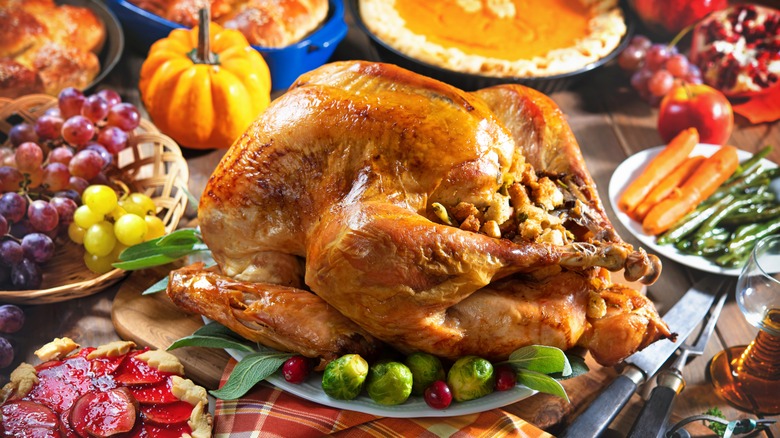Can You Eat Too Much Turkey?
Turkey is considered one of the healthiest types of meat — and for good reason. Loaded with protein, it fills you up quickly and makes it easy to keep your calories in check. Plus, it's low in fat and rich in magnesium, zinc, iron, potassium, choline, selenium, and vitamin B12. A 3-ounce serving delivers over 25 grams of lean protein, 4 grams of fat, and 145 calories, notes WebMD. Turkey also contains tryptophan, an essential amino acid that your body converts into serotonin, one of the so-called "happy hormones." Tryptophan promotes relaxation and may induce sleep when consumed in large amounts, explains Winchester Hospital.
A typical serving of turkey is 2-3 ounces or the size of your palm (per the University of Illinois Extension). The legs, thighs, and wings are the highest in fat, especially when served with the skin on. Turkey breast is the lowest in calories and fat, but you still need to watch your portions. This type of meat is often served with gravy, herb butter, sauces, and other high-fat or high-sugar foods, which can increase the calorie count — not to mention red wine and other alcoholic beverages! These combos are responsible for the so-called "turkey coma," according to Winchester Hospital.
The question is, can you eat too much turkey? And what's the worst thing that could happen if you go overboard?
This is what happens when you eat too much turkey
Turkey meat is safe when cooked properly, and eating too much of it at once won't cause major issues. However, you may experience bloating, gas, and indigestion. Like all meats, turkey doesn't contain dietary fiber. A diet low in this nutrient can lead to diarrhea or constipation, among other side effects. "[Fiber] helps normalize transit time by moving contents along the digestive tract. It also absorbs water, which leads to softer stools, making it easier to pass through your digestive tract," dietician Samantha Hass told Aaptiv.
On top of that, turkey increases satiety due to its high protein content, per Today's Dietitian. If you go overboard, you may feel too full to eat veggies and other high-fiber foods, which may cause irregular bowel movements. In the long run, it can lead to nutrient deficiencies because meat doesn't contain vitamin C, flavonoids, and other antioxidants, explains Healthline.
Eating too much of any food, including turkey, can also trigger heartburn, warns WebMD. That's why health experts recommend spreading your meals throughout the day and avoiding late dinners. Last but not least, overeating promotes the release of inflammatory cytokines, which may affect brain function and cause drowsiness, explains Sigrid C. Veasey, a professor of medicine at the University of Pennsylvania (via the Philadelphia Inquirer). The turkey meat itself contains too little tryptophan to make you sleepy, but eating too much of it can have this effect.


